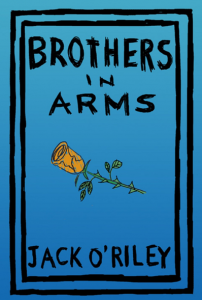
There’s a distinct Raymond Carver feeling to O’Riley’s narrative, especially in the lack of quotes for dialog and never spelling “it’s” correctly. It seems like a mistake at first, but really it’s to point out that these guys are incredibly sloppy. It’s not that O’Riley’s not paying attention, it’s that his characters aren’t. This device works very well. O’Riley’s prose is lyrical and evocative.
In the first part of the book, there’s constant drinking and barfight hi-jinks. One of the issues is that it falls too hard on the hi-jinks, and not enough on the depressing life of an alcoholic. They’re getting into ‘trouble’ but none of that trouble seems to have any real consequence, even when they’re getting beaten to a pulp. So when the group of friends finally do commit their crime, it seems to come a bit out of leftfield. It’s not a smooth transition from drunken bar brawl to breaking the kneecaps of a nice suburban couple and spray painting something on their car like the Manson family.
The purpose of this introduction to the band of brothers comes in Part Two, where we get the perspective on the crime from the media, lawyers, and the victims themselves. A friend of the victims, who’s a radio DJ, wants to see justice served and riles up his fan base. Meanwhile, the victims are seen as less than pious.
At this point, the tenor of the novel switches from Carver to Tom Wolfe. That combination of voices could be an amazing narrative trick, however the writing is not quite as deft as that. At times the book feels like a great epic satire that’s in need of some better organization. The fact that new characters are introduced well into the book contributes to this feeling of unevenness. The book might have worked better if it had woven the separate parts of the book together, or found some way to introduce the rest of the players much earlier, before the crime is ever committed.
Interestingly, the book asks of the reader exactly what the Twin Cities are asking about the crime: Who are the good guys and the bad guys? The ‘brothers’ are entertaining; just out for a good time, and we’re more or less supposed to like them. However, they’re not quite likable enough to pull this off, and their crime is so gross that you quickly lose sympathy for them. They aren’t anti-heroes, they’re creeps. Threatening the woman with rape pretty much writes them off as good-guy protagonists, for one.
This issue affects the overall theme of the novel. If we never side with them, we can’t really get caught up in the frenzy, no matter how dimwitted or corrupt the victims turn out to be. Whoever they are, they don’t deserve to be beaten senseless.
There’s a very good novel in here, but its switch in tone, though ambitious, doesn’t hit the right notes throughout. O’Riley’s an exciting writer, who’s asking the right questions in his novel, but the book might be ambitious to a fault, and better served by being pared down, and therefore it’s begging for a professional content edit before it will truly become the book it needs to be under the penmanship of this potentially provocative author.
Review Overview
Design
Content
Editing
Get an Editorial Review | Get Amazon Sales & Reviews | Get Edited | Get Beta Readers | Enter the SPR Book Awards | Other Marketing Services






















Leave A Comment